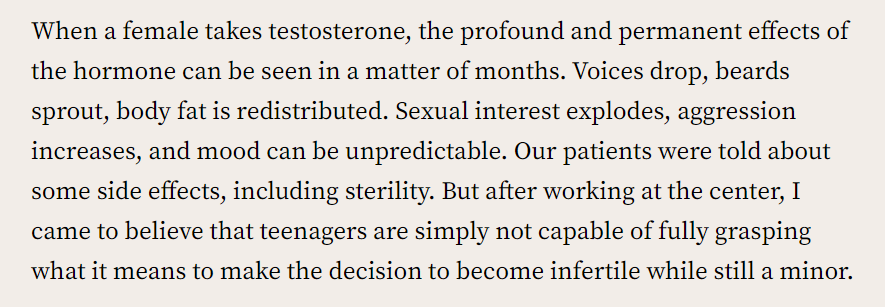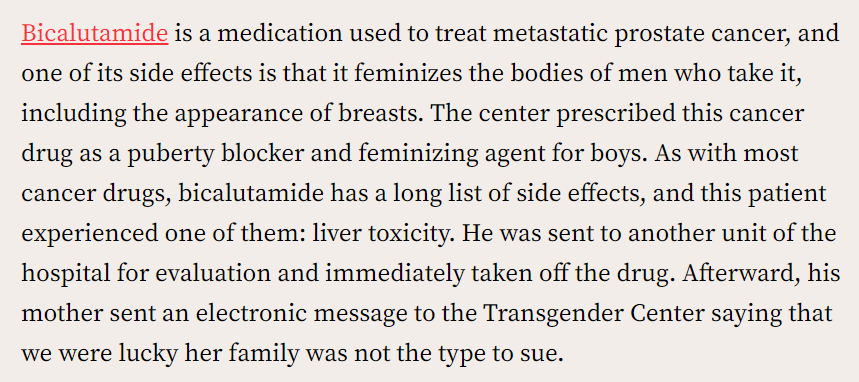Missouri Woman Claims Gender Clinic Pushes Transition on Youth
Jamie Reed’s whistle blowing consists of wild, unproven accusations and distorted facts.
by Evan Urquhart
Reed in her office. (Theo R. Welling).
A woman who worked for four years as case manager for the Washington University Pediatric Transgender Center at St. Louis Children’s Hospital now claims the Center was too quick to approve medical treatments such as puberty blockers and hormones, and that patients and their parents didn’t always understand the treatments well enough to consent. After Reed went public the Attorney General for the state of Missouri revealed that he’d opened an investigation into the hospital on the basis of Reed’s allegations, according to Fox News.
Reed wrote about her experiences yesterday for Bari Weiss’ substack, The Free Press. (Although Weiss styles herself an independent journalist, she’s much better understood as an anti-cancel culture grifter. She has worked as an editor for the Book Review and Op-Ed sections of the Wall Street Journal and the New York Times, and has served as an opinion columnist and culture writer throughout her career, but has never done reporting or investigative work.)
In the piece, Reed primarily alleges that the psychologists and doctors she worked with were too quick to diagnose gender dysphoria and prescribe puberty blockers and hormone treatments to youth, and that the informed consent process was insufficient for the patients or their parents to fully understand the treatments or their risks. Some of what Reed says is specific, referring to the details of individual cases that she believes were mishandled by the medical staff at the Transgender Center, but much more of it is vague. Some of the medical details are provably wrong, perhaps because Reed lacks a firm grounding in the specifics of gender affirming treatments or their common side effects.
For example, Reed says that one of the side effects of testosterone therapy is infertility. This is false.
A study in 2020 found that transgender men who stopped taking testosterone have similar egg yields to cis women. This was just one of several recent studies which have challenged an earlier belief that taking testosterone for long periods of time would likely result in permanent infertility. There are now many stories of trans men who have been on testosterone for an extended period of time becoming pregnant and carrying children of their own. (While Reed’s focus is on the impact of testosterone on fertility, research also indicates that trans people who take estrogen can also regain fertility when they pause treatment.)
While individual bodies differ, it’s simply false to say or imply that lifelong infertility is a common or likely side effect of testosterone treatment. If Reed genuinely believes this, then it speaks to a profound ignorance about the details of transgender medical care. This ignorance is relevant because her lack of understanding may have led to misunderstandings or misinterpretations of her experiences when she worked at the Transgender Center.
Overstating and mischaracterizing side effects are a consistent theme in Reed’s essay. At one point she describes a patient on testosterone who had such severe vaginal bleeding after intercourse that he required a trip to the emergency room. This sounds like a horrific experience for that patient, but it is also incredibly atypical, and extreme. Vaginal dryness is a common side effect of testosterone, and vaginal atrophy is a somewhat rarer (though not uncommon) side effect that can develop over time. This atrophy is similar to what happens to the vaginas of postmenopausal women. However, severe vaginal bleeding requiring emergency care is so uncommon it’s hard to know what to make of Reed’s claim. If it happened as Reed describes it, intercourse resulting in unexpected and severe bleeding, it would be a truly unusual event. However, there may have been other factors, perhaps ones which Reed was unaware of, or ones she chose not to share. For example, the person with whom the young trans man had intercourse may not have stopped even though the young man was experiencing severe pain.
More typically, trans men do experience pain from dryness, and may require additional lubrication to enjoy vaginal penetration. When atrophy occurs trans men can seek treatment with topical estrogen cream to reverse the effects. Greater awareness of vaginal atrophy and its treatment is certainly worth raising awareness about, but a bizarre story about a teenager who required an emergency room visit after intercourse is in no way helpful in accomplishing that.
In another example of mischaracterizing how common rare side effects are, Reed discusses a young patient who was treated with an anti-androgen called bicalutamide. She says, “bicalutamide has a long list of side effects, and this patient experienced one of them: liver toxicity.”
Liver toxicity seems to be an extremely rare adverse effect of bicalutamide, one that usually shows up in the first few days after starting the drug. It’s so rare that the medical literature around it all involves individual case histories, rather than statistical analyses. These sorts of extreme reactions or allergies are a risk of almost every medical treatment there is. In the case bicalutamide, verified cases of liver toxicity seem to be in the low single digits. The Wikipedia article on the drug says “at least 10 cases” have been published in the literature as of 2021. Reed also describes the medication as a cancer drug, misleading language that carries an implication of rarity, toxicity, and extreme measures. While anti-androgens are often used in cancer treatment, they have many uses, including being used for cis women who have high testosterone, to counteract the effects on their appearance and voice. These medications are totally separate from chemotherapy, a type of drug treatment synonymous with both cancer treatment and extreme side effects in many readers’ minds.
Reed also shares emails with a colleague discussing their reservations about whether this particular patient was aware that they might develop breasts on bicalutamide. Breast growth is a common side effect of the drug, and the email seems to indicate that there were concerns that the patient might not be aware of that side effect in the lead up to treatment. Reed then explains the patient eventually started the drug, and went on to experience a rare adverse reaction. However, the emails don’t provide any context for judging what the patient and their parents understood at the time the drug was prescribed, or why it was chosen.
The email in this screenshot is typical of other emails Reed shares, in that it documents the fact that Reed had concerns, but fails to shed any light on whether those concerns were well-founded, or what actions, if any, were taken to address her concerns by the other staff. In the email about bicalutamide Reed says she doesn’t think they should start medication, but deciding what medication to prescribe would not have been part of her role as a case manager. Reed doesn’t provide evidence bearing on how clinicians responded to her concerns, including whether they addressed them with the patient and family before moving forward. Reed seems to take the subsequent decision to move forward as proof her concerns were never addressed at all, but it’s equally possible they were thoroughly addressed with the family, and only after doing so was the decision to move forward with treatment made.
Almost none of what Reed alleges involves a clear situation where, if what she says is true, it would unambigiously point to wrongdoing on the part of the doctors or other clinical staff. The one exception is an anecdote in which Reed claims a patient who never experienced gender dysphoria was prescribed cross-sex hormones. (We decided against sharing a screenshot, because it contains sensitive, personal details about a young person’s mental health. While Reed does not name this or any other minor, her treatment of sensitive case details is alarming. We have no reason to trust the cases have been adequately anonymized, and are therefore not sharing information that might be identifying in some way.)
The paragraph dealing with this patient, though very specific about some detauls of their mental health struggles, is incredibly vague when it comes to how and why they were treated by the Transgender Center team. Reed says the patient was prescribed hormones, and says she never got a clear answer as to why. While it would be concerning if a patient who was not experiencing gender dysphoria was treated for gender dysphoria, what she actually says only suggests that she wasn’t necessarily privy to the specifics of treatment decisions in these patients.
Reed seems to have often formed her own judgements, contrary to the judgements of those who were diagnosing and prescribing medication to the youth. It’s certainly not impossible that Reed’s judgments could have been superior to those who qualified to prescribe, but it’s impossible for the reader to judge that based on such thin gruel.
There’s going to be much more to come out about both Reed and the Transgender Center at which she worked. Despite the vagueness of her allegations and Reed’s lack of expertise, it’s far from impossible that there was or is something unsavory going on at this particular clinic in Missouri. Because trans people are a vulnerable, desperate population, it’s not unheard of for unethical doctors to gravitate to specializing with the trans community, relying on the desperation and marginalization of their patients to cover any misdeeds. This is far less likely for clinics which treat transgender youth, however, because middle class cisgender parents are not particularly marginalized or desperate. More typically they are highly skeptical and need doctors who will move slowly and take their concerns seriously before they agree to gender affirming care.
Reed has taken her story to the Missouri Attorney General, Andrew Bailey, who has launched an investigation into the Transgender Center where she worked. Bailey was appointed by Republican Governor Mike Parsons in January to replace the previous AG who won election to the U. S. Senate. He previously served as the general counsel for the governor. Because of the investigation the story is being extensively hyped in the right wing press, where Reed’s inaccurate medical descriptions, bizarre anecdotes, and vague insinuations are being taken as fact. If there’s anything substantive beneath all this muck it has yet to emerge.






